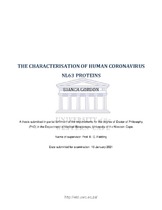| dc.description.abstract | Human Coronavirus NL63 (HCoV-NL63) is one of seven coronaviruses (CoVs) that cause respiratory disease in the global population. The Membrane (M) and Nucleocapsid (N) proteins are part of the core CoV-structural proteins, crucial in viral replication and virion assembly. Here the expression of HCoV-NL63 M and N was characterized across multiple in vitro systems including bacterial, insect and mammalian. To detect untagged proteins in viral structural studies, anti-peptide antibodies were generated in a mouse model. Polyclonal antisera and hybridoma-secreted antibodies exhibited specific binding to their respective full length protein antigens. Anti-peptide monoclonal antibodies were successfully generated against the HCoV-NL63 M and N proteins. During CoV infection, the interaction of CoV M and N is necessary for the production of infectious virions. For the first time, co-expressed, full length HCoV-NL63 M and N were assayed for protein-protein interaction in a mammalian cell system, allowing for native protein folding and modification. M protein formed higher order homomultimers in the presence and absence of co-expressed N. | en_US |

